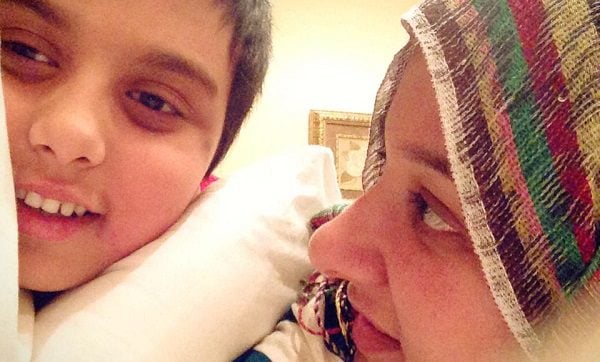 April 15, 2015 – Autism Awareness Month, Autism Truths #15
April 15, 2015 – Autism Awareness Month, Autism Truths #15
The truth of it is, it’s very hard to tell a true story when the one who is the central person in that tale has no say in the matter.
Is it fair, then, to share D’s story when he cannot share it himself?
Am I getting it right?
Am I writing things he would want to have written or shared?
Am I guarding his privacy the way it should be guarded, while sharing enough to be honest about his — and our — autism journey? I think I am, with some mistakes made along the way. But what does he think?
A few month ago, I read one of the most thought-provoking blog posts by an autism parent. Susan Senator, a writer, author, activist and mother of three boys, penned a piece called “I am Nat’s Ghostwriter,” in which she mused on the role of the caregiver, on the goal so many of us have for our children to be able to self-determine their futures, and about how if a loved one with autism can’t do that, then are their care-givers to be included as part of their “Autistic Self-Advocacy Network?”
“I know I can speak for caregivers — the ones who really, truly care for and about their autistic loved ones, not the ones who phone it in or worse — when I say that we deserve a welcome at that table. And I do feel welcomed by the autistic self-advocates, and I think that’s how it should be. I wish their language could be amended to reflect the fact that people who have the challenges Nat faces really depend on others to speak for them. Some things about him have to happen without him. I wish it were not so, because I want him to be the author of his life. But he always has a ghostwriter, mostly me.
I don’t know how Nat feels about this reality. Is he used to not doing a lot of things for himself, by himself? Does this bother him? Or is he accepting of it? Maybe both. I guess everyone’s different in how much they accept of their inabilities. Anyway, I try so hard to talk to him, to include him in our conversations, but he still is talked about, talked over. Others are far worse than me in this regard. I’ve seen so many well-intentioned people ask me what he’d like to drink. To them, I am that intertwined with Nat’s presence. They think I know.”
These same questions have permanently bore themselves into my brain. I’ve tried so hard to not talk about D like he doesn’t hear me. To not speak over him. To not discuss him in front of him. I wouldn’t do that to my other children. Why should I do that to D? I want to be the model of this behavior — that he may not “say” anything, but he hears and understands everything.
But even I continue to make mistakes. I’ll go up to check on him during home therapy, and his therapist will talk about D being upset or something they worked on, or trying to figure out a behavior – and D is right there. I start talking too and then catch myself — right D? Is that why you aren’t feeling it today? I’ll say to him, trying to cover my mistake.
The things I want the world to do with D — those things I fail at myself within the walls of our hearth and home. I want the world to talk to him. I want the world to ask him questions first instead of asking me first, even though 99 percent of the time thus far he cannot answer. But he should be given the chance. And yet, I determine and decide things for him all the time. Sure, its with a mom’s love and with my best educated guess about what he wants/needs. But still …
Writes Senator:
“As for Nat, not being able to speak for himself much is one of Nat’s greatest challenges. He is frequently passive or unable to determine what he wants, and so it is a complete conundrum to help him in this regard. Helping him not be passive — the only way to do that is to sabotage things, make him so frustrated that he has to ask for them. It feels cruel and in the end, it doesn’t really help. It’s an ABA-ish solution, one where you may end up helping but the means of doing so are questionable.
You can’t force someone to move past their disability. You have to accept their limitations as much as they need to. You have to give help, and they have to accept it, but you also have to not help sometimes. Sometimes you also have to step back and let things go on in an unsatisfying, imperfect way. I don’t like that.”
I don’t like it either. I don’t like that D is a passive character in the story of his life, as told by me. I worry that in my trying to help others by sharing our story, am I hurting D? Am I saying things he would rather have remained private? Am I speaking for him when he may not want to be spoken for?
I can say I have the best of intentions. I am trying my best to consider his thoughts and feelings. Truthfully, I am. But more truthfully, as Senator says, I’m letting things go on in an unsatisfying, imperfect way.
And I don’t like that.













